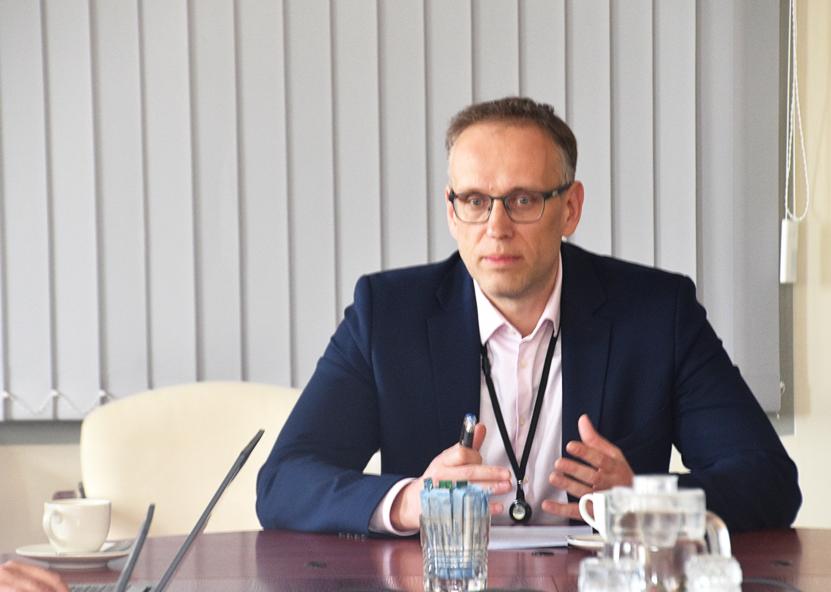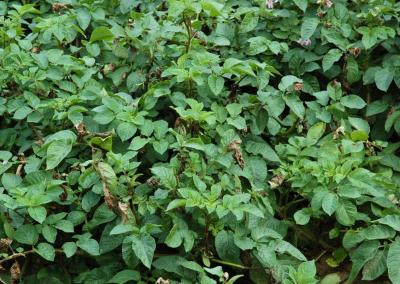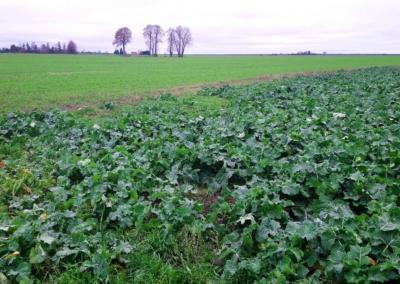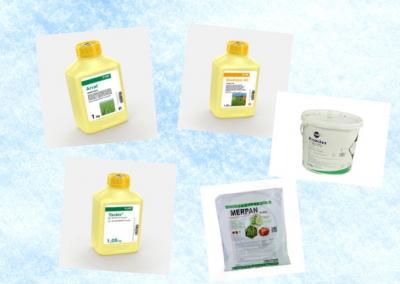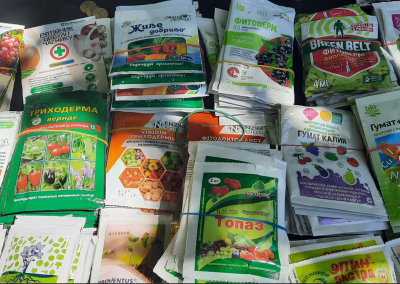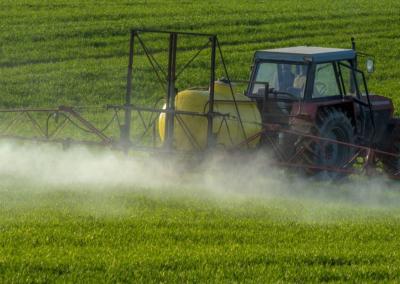Plant Protection Service: what plant protection products are missing?
Last week, Kaunas District Farmers' Union together with the State Crop Production Service and the Lithuanian Agricultural Advisory Service organised a workshop & discussion „Application of plant protection products in practice“.The meeting discussed the wider range of registered plant protection products in the fight against plant diseases and pests, product accounting, active substances, storage of fertiliser products, etc.
It was agreed that the structured problems and proposals of the farmers would be submitted in writing to the responsible authorities, and the State Plant Protection Service, within the limits of its competences, would look for prompt solutions, and would soon bring back to the round table the farmers, the distributors of the plant protection products or their authorised representatives, and the responsible staff of the Ministry of Agriculture for a joint discussion and the necessary work.
Service specialists have heard the farmers' requests and, as a matter of urgency, evaluated the requests and suggestions received by e-mail from the meeting participants. Spring work is not just a matter of waiting for spring, but also plant growth products for professional use are not a commodity to be bought on the shelf of a shop, so a round table discussion at the State Plant Breeding Service brought together experts from the Ministry of Agriculture, the State Agency for Agriculture, the Lithuanian Farmers' Union, and the representatives of the association "Croplife“".
With the greenhouse season in full swing and the concerns of berry growers, gardeners and other farmers about to start, we want to address their concerns and try to be helpful, which is why the Farmers' Union is raising the issue of the shortage of insecticides, herbicides and fungicides. Perhaps their use could sometimes be extended to other plants and pests, or perhaps new plant protection products that are already available in Europe but not registered in Lithuania are needed. As farmers, we need to ensure that our crops are healthy, we need to supply healthy, quality products, and we are also seeing the effects of climate change – the intensification and spread of outbreaks of plant diseases. We hear about resistance and pest resistance to certain active substances, we hear complaints from the beekeeping community – all connecting vessels and we want to work together to find an effective formula, safe and useful active substances – said Mindaugas Miciulevičius, chairman of the Kaunas District Farmers' Union, who initiated the initial meeting with the farmers.Experts from the Service pointed out that year after year farmers start thinking very late about the shortage of plant protection products. When the spring work starts, we are in a hurry, but we don't submit applications or documents, and the Service doesn't even have anything to assess and register. Registering products in the normal way or under the mutual recognition procedure would save us from having to scratch our heads every year and exceptionally apply for that temporary 120-day authorisation, said Rasa Rimkutė, Deputy Director of the VAT. We currently have a request for 9 products to be considered for use, one of which has already been decided and authorised. The good news is that these active substances are approved in the EU, which means that solutions can be found one way or another.Experts from the Authority stated that there are no representatives of some manufacturers of plant protection products in Lithuania, so nobody applies for the registration of these manufacturers' products in Lithuania. „The authorised representatives replied promptly to provide data on the fungicide „Luna care“ in order to authorise the use of this product for a period of 120 days for apple and pear trees. The application is foreseen to be submitted by the distributors' representatives. However, it is in everyone's interest that in the long term this product can be registered to avoid the need for repeated authorisations for a 120-day period, said Kristina Valionienė, head of the Plant Protection Products Registration Division at the VAT.
Another product – insecticide Limocide, with orange peel oil as active ingredient. Growers informed that they are collecting information on this product and intend to submit an application for a period of 120 days. The growers plan to apply for a temporary 120-day period for the use of the fungicide „Fontel 200 SC“ for the control of diseases in apple trees.
Authorisation for the use of the fungicide „Nordox 75 WG“ for the control of fungal diseases of apple trees was granted on 17 March. The growers are requesting a reduction of the withdrawal period of 144 days, but it should be noted that the authorisation was based on a Polish registration report with a withdrawal period of 144 days, and that this reduction is not possible due to the results of the residue tests at the time of the harvest. Residue testing is carried out and the withdrawal period is determined for each crop grown. The withdrawal period established for one crop cannot be applied to another crop. For example: the withdrawal period for grapes cannot be applied to apples. In order to ensure that consumers eat safe food moreover, if the apple crop is a product participating in the 'exceptional quality schemes', there is no way to shorten the withdrawal period the experts stated.„A short-term solution of a 120-day authorisation is something that can be done this season, with an obligation to submit a report in a defined format afterwards. The medium-term solution is to accelerate the mutual recognition of products registered in the EU, something we discussed last autumn. Schoolchildren raised the issue of accessibility of products. Greenhouses are classified in the same zone throughout Europe and mutual recognition of data is particularly relevant. I think that we can trust the assessment of experts from foreign countries, such as the Netherlands, and not apply the Lithuanian expert assessment," said Zita Varanavičienė, Director of „Croplife“ Association. – That temporary 120-day permit decision is an emergency in case of clinical death. However, such a defibrillator “ is not useful for either business or growers, because we all need stability and planning. In the long term, the proposal that farmers keep mentioning to try to include Lithuania in the EU's central zone has, in our view, more disadvantages than advantages. The industry operates in all zones, so we have experience of the situation in other zones. Adding a country to a new zone is a long-standing issue requiring the agreement of a majority of EU countries. We would not be against it, but it will not solve anything as long as Lithuania applies the national assessment criteria", the head of the association "Croplife" agreed with the opinion of the experts from the Ministry of Agriculture and the State Crop Production Service.
Raimundas Juknevičius, chairman of the Lithuanian Farmers' Union, stated that they represent a large number of farmers, but that the farming associations are administratively weak and fragmented; there is no-one to write the applications, especially as it is not provided for in the organisations' regulations, and the most frequent complaints are that the State is not doing something. The needs come both to the office and to the ministry. Producers' representatives are also aware of them. Someone should take the lead and make those requests. The Farmers' Union, representing the public interest, could make such requests, but it is also constrained by administrative resources, but if there is goodwill on all sides, we will certainly do it, although we should consult with business – cooperatives, business partners“ on distribution," Juknevičius said.„We need to discuss the next steps, what needs to be done by each stakeholder to move forward successfully. Farmers' demand – is known. We often get lost in bureaucratic entanglements, constantly in meetings. There is a lot of information and it is difficult to move from one place to another. We need to take a constructive look at what the Authority can do, what the distributors can do, what the operators, the farmers can do. We have to put the dots, the deadlines in sub-paragraphs. For example, for temporary use of products for a period of 120 days, farmers, their associations and cooperatives have to apply to the IAS, for scientific expertise on the spread of plant diseases, and for long-term use, distributors have to submit applications. The Plant Protection Authority is involved at the last stage of the process, when the applications and the necessary documentation have already been submitted. I think it would be appropriate to set up a permanent expert commission, a working group bringing together representatives of the Ministry of Agriculture, the State Plant Breeding Service, the Lithuanian Farmers' Union, and the associations of gardeners', horticulturalists', and greenhouse growers' associations of university scientific institutions. Such a commission will have plenty of activities and challenges throughout the year, so that next year we do not have to discuss the same exceptions again by exception“, - summarized the results of the meeting, wishing good luck to all and a good harvest to all, - Director of the State Plant Breeding Service, Yurij Kornijenko.


































































































